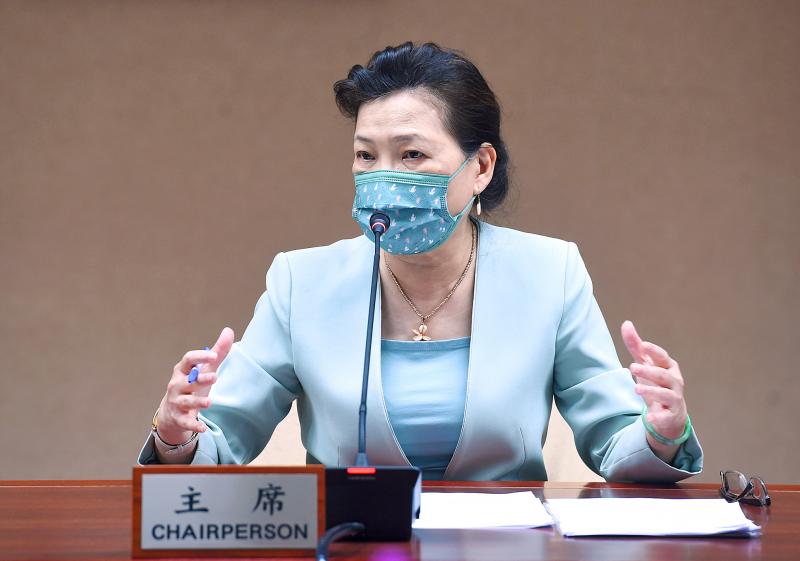China’s surprise application to join the Comprehensive and Progressive Agreement for Trans-Pacific Partnership (CPTPP) would not force Taipei’s hand in its own application, Minister of Economic Affairs Wang Mei-hua (王美花) said yesterday.
Speaking to reporters outside the Legislative Yuan in Taipei, Wang said that Taiwan has been pursuing back-channel negotiations with friendly countries to lobby for its inclusion in the CPTPP and other bodies.
“Our strategy is to line up allies in a low-key manner and work on building consensus before pursuing any official application,” Wang said. “That way, things tend to happen smoothly as a matter of course.”

Photo: Liu Hsin-de, Taipei Times
China, on the other hand, surprised the world when it moved to officially join the trade pact of 11 Pacific Rim countries, including Australia, Canada, Chile, Japan and New Zealand, she said.
Beijing’s surprise bid for inclusion does not mean Taipei should feel pressured into making a parallel bid, she added.
“There’s no set timetable for inclusion after an official bid,” Wang said. “There are certain procedures, and there has to be consensus from member countries that inclusion is appropriate.”
Wang said China’s moves to crack down on economic activities and unfriendly trade relations with CPTPP member nations could hurt its chances of inclusion.
“We could question if China meets the CPTPP’s high standards for inclusion right now,” Wang said. “Recently, China has repeatedly interfered with the economy in highly illiberal ways, heightened surveillance, reduced transparency and even banned imports without proper cause.”
Taiwan has been working on market liberalization and legal framework adjustments to be “CPTPP compatible,” Wang said.
The CPTPP is the successor to the Trans-Pacific Partnership, from which former US president Donald Trump withdrew during his tenure. The withdrawal of Taiwan’s most powerful supporter from the regional agreement has been seen as detrimental to Taiwan’s chances.
“Of course US support is always welcome in helping Taiwan join international organizations,” Wang said. “However, US President Joe Biden might have a lot to deal with right now with the [COVID-19] pandemic, economic recovery and strengthening bonds between allies.”
The CPTPP might also have to make some changes on issues such as the environment and labor before the US becomes more amenable to inclusion, Wang added.

MAKING WAVES: China’s maritime militia could become a nontraditional threat in war, clogging up shipping lanes to prevent US or Japanese intervention, a report said About 1,900 Chinese ships flying flags of convenience and fishing vessels that participated in China’s military exercises around Taiwan last month and in January have been listed for monitoring, Coast Guard Administration (CGA) Deputy Director-General Hsieh Ching-chin (謝慶欽) said yesterday. Following amendments to the Commercial Port Act (商港法) and the Law of Ships (船舶法) last month, the CGA can designate possible berthing areas or deny ports of call for vessels suspected of loitering around areas where undersea cables can be accessed, Oceans Affairs Council Minister Kuan Bi-ling (管碧玲) said. The list of suspected ships, originally 300, had risen to about 1,900 as

Japan’s strategic alliance with the US would collapse if Tokyo were to turn away from a conflict in Taiwan, Japanese Prime Minister Sanae Takaichi said yesterday, but distanced herself from previous comments that suggested a possible military response in such an event. Takaichi expressed her latest views on a nationally broadcast TV program late on Monday, where an opposition party leader criticized her for igniting tensions with China with the earlier remarks. Ties between Japan and China have sunk to the worst level in years after Takaichi said in November that a hypothetical Chinese attack on Taiwan could bring about a Japanese

MORE RESPONSIBILITY: Draftees would be expected to fight alongside professional soldiers, likely requiring the transformation of some training brigades into combat units The armed forces are to start incorporating new conscripts into combined arms brigades this year to enhance combat readiness, the Executive Yuan’s latest policy report said. The new policy would affect Taiwanese men entering the military for their compulsory service, which was extended to one year under reforms by then-president Tsai Ing-wen (蔡英文) in 2022. The conscripts would be trained to operate machine guns, uncrewed aerial vehicles, anti-tank guided missile launchers and Stinger air defense systems, the report said, adding that the basic training would be lengthened to eight weeks. After basic training, conscripts would be sorted into infantry battalions that would take

DEEP-STRIKE CAPABILITY: The scenario simulated a PLA drill that turned into an assault on Taiwan’s critical infrastructure, with the launchers providing fire support Taiwan yesterday conducted this year’s first military exercises at Longsiang Base in Taichung, demonstrating the newly acquired High Mobility Artillery Rocket System’s (HIMARS) ability to provide fire support and deep-strike capabilities. The scenario simulated an attack on Penghu County, with HIMARS trucks immediately rolling into designated launch areas and firing barrages at the Wangan (望安) and Cimei (七美) islands, simulating the provision of fire support against invading forces. The HIMARS are supposed to “fire and leave,” which would significantly increase personnel and equipment survivability, a military official said. The drill simulated an exercise launched by the Chinese People’s Liberation Army (PLA) Eastern